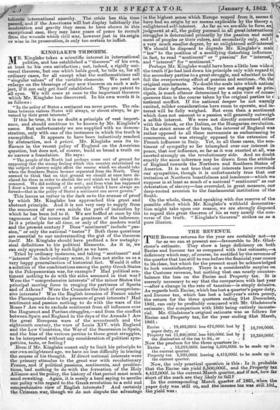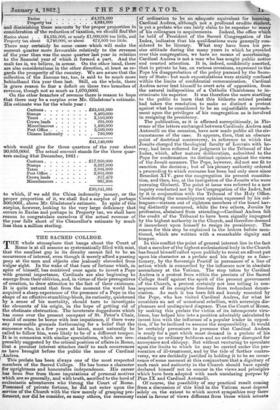THE REVENUE. T HE-Revenue returns for the year are certainly not—so
far as we can at present see—favourable to Mr. Glad- stone's estimate. They show a large deficiency on both Excise and Income tax as compared with that estimate,—a deficiency which may, of course, be rectified by the revenue of the quarter that has still to run before the financial year comes. to its close, but which for the present must be acknowledged to look unsatisfactory. There is a considerable surplus on the Customs revenue, but .nothing that can nearly counter- balance the loss on the Excise and Property tax. It is scarcely necessary to say that the comparison with last year —after a change in the rate of taxation—is simply delusive. As regards both Excise, which has lost a quarter's paper duty, and Income tax, which has lost a half-year's extra penny, the return for the three quarters ending 31st December, 1861, can only be profitably compared with Mr. Gladstone's estimate ; the comparison with 1860 being entirely immate- rial. Mr..Gladstone's original estimate was as follows for Excise and Property tax, for the year ending 31st March, 1861:
Excise . . 19,463,0001. less 675,0001. lost by )
18,758,0001. paper duty, or
Property tax 11,200,000/. less 850,0001. lost by the diminution of the tax to 9d., or . . 10,360,0001. . . . . .
Now the produce for the three quarters is : Excise . . 13,288,0001. leaving 5,500,0001. to be made up in the current quarter. Property tax 5,938,0001. leaving 4,412,000/. to be made up in the current quarter.
Now, the only practical question is this : Is it probable that the Excise can yield 5,500,0007., and the Property tax 4,412,000/. in the current March quarter, and if not, how far short of the mark Are they likely to fall ? In the corresponding March quarter of 1861, when the paper duty was still on, and the income tax was still 10d., the yield was :
Excise £4 873,000 Property tax 4 024,000
and diminishing these amounts by the proper proportion in consideration of the reduction of taxation, we should find the Excise about . . 24,535,000, or nearly 21.000,000 too little, and Property tax about 3,740,000, or about 672,000 too little. There may certainly be some cause which will make the current quarter more favourable relatively to the revenue of the year than was the same quarter last year in relation to the financial year of which it formed a part. And the malt tax is, we believe, in arrear. On the other hand, there are also considerations in the other direction, at least as re- gards the prosperity of the country. We are aware that the collection of the Income tax, too, is said to be much more behindhand this year than last. Still, on the whole, there is grave reason to fear a deficit on these two branches of revenue, though not so much as 1,670,0001.
On the other branches of revenue there is reason to hope that there may be a surplus over Mr. Gladstone's estimate. His estimate was for the whole year : Customs ..... . . . 223,585,000 Stamps 8 460,000 Taxes 3,150,000 Crown lands 295,000 Miscellaneous 1,400,000 Post Office 3,500,000 Chinese Indemnity 750,000 241,140,000 which would give for three quarters of the year about 80;855,000l. The actual amount stands for the three quar- ters ending 81st December, 1861: Customs 217 950,000
Stamps
6 297,000 Taxes 2 805,000 Post Office 2,605,000 Crown lands 217,479 Miscellaneous 967,386 230,841,865 to which, if we add the China indemnity money, or the proper proportion of it, we shall find a surplus of perhaps 500,0001., above Mr. Gladstone's estimate. In spite of this surplus, however, looking to the very large deficiency that occurs in Excise and perhaps in Property tax, we shall have reason to congratulate ourselves if the actual revenue of the year falls short of the Chancellor's estimate by much less than a million sterling.



































 Previous page
Previous page